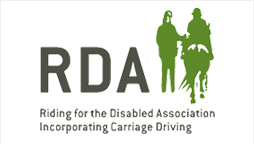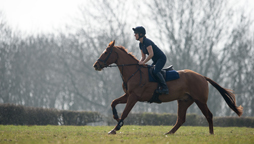Learn to ride
Would you like to have a go at horse riding?
You may think you need your own horse or pony to ride or take part in equestrian sport, but this is definitely isn't the case – especially when you're learning. Riding centres across the country can not only provide you with tuition in the saddle, but a horse or pony suited to your ability, height and weight.
Horse riding is an activity that's open to all ages and all abilities, it's never too early or too late to start learning. Being around horses and ponies has been shown to benefit people in many different ways – it's great for your physical fitness, help your mental wellbeing and relieve any stress you may have. It's also a chance to meet other people from lots of different backgrounds who share a common interest.
Being able to ride allows you not only to enjoy the company of horses and explore the countryside in the UK and beyond, but it provides you with access to a whole range of equestrian sports such as dressage, showjumping, eventing, polocrosse, horseball, endurance, mounted games etc. However, you don’t have to ride a horse to take part in some equestrian sports – there are centres that offer other activities, including carriage driving and equestrian vaulting, which is gymnastics on horseback.
Who can learn to ride?
Adults
You're never too old to start riding. There will be lots of adults at riding centres, so you definitely won’t be alone. Most riding centres will suggest private one-to-one or semi-private lessons when you are starting out, then you can progress into a group lesson if you choose. Enquire with the riding centre when you give them a call to book your lesson.
Children and Young People
You can start riding from a very young age, and most riding centres cater for children and young people. However, it's always advisible to check their minimum age requirements when booking a lesson. Pony Club Centres host Pony Club activities for children and young people without their own ponies, with activities including rallies and camps, as well as group training and assessment on horse care and riding.
people with disabilities
Horse riding is one of the most accessible sports for people with disabilities or those with a long-term health condition – nearly a quarter of equestrian participants say they have a disability. However, you may want specialist sessions, which are offered by Riding for the Disabled Association (RDA). There are over 500 RDA groups within the UK, which can be found using the Find a Riding Centre tool.
There are also over 50 riding centres in the UK with Accessibility Mark accreditation that are able to offer sessions to disabled riders. Each accredited centre has been through training with experienced RDA coaches to ensure they're able to meet the high standards required by the RDA. Once centres have gained the Accessibility Mark status, they're offered continuous support from the RDA to ensure they provide you with a fantastic service whatever your level of riding.
Finding a Riding Centre
The best way to find a riding centre near you is to use the Find a Riding Centre tool.
All riding centres in the UK must be legally approved by their Local Authority, which checks the centre for compliance with animal welfare standards. Local councils maintain a public register of licensed riding centres in their district. If a premises holds a licence, it should be displayed prominently at the location, making it easy to verify.
Many centres listed on our website are also approved by one or more of our member bodies, ensuring that they are fully insured, have a trained Safeguarding Officer who has had a criminal record check approved by their Member Body, have qualified coaches, and have essential health and safety policies in place, so that, if any standards ever fall short, there are clear processes in place. The organisations that approve riding centres in the UK are:
- The Association of British Riding Schools
- The British Horse Society
- The Pony Club
- Riding for the Disabled Association
It's recommended that anyone looking to book your first riding lesson, whether it be for yourself or a child, at an affiliated or unaffiliated riding school, it's good practice to ask questions around their safeguarding and insurance policies to give you a better idea of what to expect and what to look out for. Check our advice for parents and carers here.
When choosing a riding school, it is worth noting that a well-run riding school will be happy to share how they organise things. Talk to those around you and check out the riding school's website and social media pages where possible because these will also give you some insights to their set-up.
Booking
To book your lesson, you'll usually have to phone the riding centre.They'll ask you questions to get an idea of your level of experience so that you're booked into the right sort of lesson and partnered with a suitable horse. The centre may offer group lessons, semi-private (normally 2-3 riders having a lesson together) and private lessons on a one-to-one basis.
Some of the questions they're likely to ask are...
• Have you ridden a horse before? If so, what have you done?
• What is your age, height and weight?
Please note that many riding centres have a weight limit for the welfare of their horses, so if you don't know your weight then you may be asked to get on the scales when you arrive the riding centre. If you think this could be an issue, please mention this at the time of booking.


